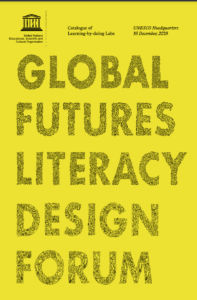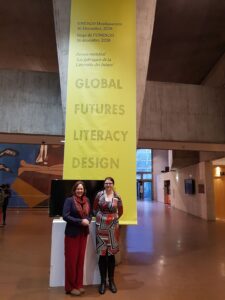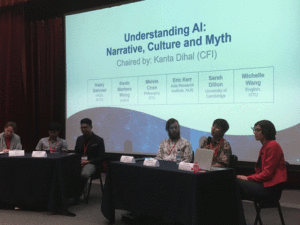I’ve just returned from a brilliant experience at the UNESCO Global Futures Literacy Design Forum in Paris. Two days of mind-opening workshops and discussions showcasing the diversity of activities globally that engage with human anticipatory systems and practices. I was involved in delivering two ‘labs’, along with my wonderful postdoctoral research assistant, Olivia Belton, pictured here alongside me. Olivia curated and led a lab developed out of our research project using a collaborative storytelling game to determine anticipatory assumptions about autonomous flight. Olivia led participants through the game she developed on the project, facilitating them to imagine near-future implementations of artificial intelligence. I curated a lab derived from the research for my work-in-progress book with Claire Craig on Storylistening. Whereas futures literacy activities often generate futures, and thereby reveal anticipatory assumptions, through collective storytelling (or other forms of collective imagining), the storylistening lab demonstrated the value to be gained from collective storylistening – that is the activity of listening to and analysing a pre-existing story. Participants worked with Ursula Le Guin’s rich short story ‘The Ones Who Walk Away from Omelas’ to think together about the questions the story raises around forms of governance, the morality of economic models, justifications of utilitarianism and the imaginative (in)ability to countenance alternatives to the status quo. I wrapped up the final day with an evening walk across Paris from the UNESCO site to Gare du Nord, along streets bedecked with Christmas lights and decorations, listening to Christmas music and enjoying the vibrancy of a city which has long been a favourite of mine.
NEW REPORT: AI and Gender: Four Proposals for Future Research
 Back in February 2019, I organised a workshop on ‘AI and Gender’, held by the Leverhulme Centre for the Future of Intelligence, co-convened with the Ada Lovelance Institute, and supported by PwC. The workshop was trans-disciplinary and trans-sectoral. It gathered together scholars from a wide range of academic fields, including computer science, history, philosophy of science, law, politics, sociology, literature, and gender studies. In addition, it brought together researchers and practitioners from industry and research centres outside of academic, as well as key figures from UK AI governance and policy. Over the course of day, seventeen 10-minute talks created a wide and detailed picture of the cutting edge of current research and initiatives into AI and gender. They also created some agreement, some disagreement, a lot of conversation, and a quite phenomenal buzz.
Back in February 2019, I organised a workshop on ‘AI and Gender’, held by the Leverhulme Centre for the Future of Intelligence, co-convened with the Ada Lovelance Institute, and supported by PwC. The workshop was trans-disciplinary and trans-sectoral. It gathered together scholars from a wide range of academic fields, including computer science, history, philosophy of science, law, politics, sociology, literature, and gender studies. In addition, it brought together researchers and practitioners from industry and research centres outside of academic, as well as key figures from UK AI governance and policy. Over the course of day, seventeen 10-minute talks created a wide and detailed picture of the cutting edge of current research and initiatives into AI and gender. They also created some agreement, some disagreement, a lot of conversation, and a quite phenomenal buzz.
We took advantage of that communal energy at the end of the day when, led by my research assistant Clementine Collett, we invited our participants to take part in a collective intelligence exercise. The challenge was to come up with at least three recommendations for new areas of research concerning AI and gender. The result was our report: ‘AI and Gender: Four Proposals for Future Research‘, which develops and augments the ideas shared during this exercise by drawing on content from the workshop presentations, questions, and discussions, as well as from a broad range of wider literature and research.
The report outlines four of the weightiest challenges to gender equality presented by recent developments in artificial intelligence (AI). In tandem, it outlines four research proposals which would effectively tackle these issues. The proposals are not intended to be prescriptive, but rather, provocative. The report aspires to use these proposals as a mechanism to raise awareness, summarise the current challenges, and prompt practical action. As we continue to see rapid development of AI systems, now is the moment to address the challenges which AI presents to gender equality. It scopes and situates current research and interventions, identifies where further research and intervention is required, and acts as a call to action to tackle issues of injustice.
We launched the report at CogX 2019 with a talk by Clemi and myself, followed by a panel discussion on AI and Gender. A video recording of the Cog X events can be seen here.
AI: Fact vs Fiction with Ian McEwan and Murray Shanahan at The Barbican
 I’ve been cutting back on my public work lately in order to focus more on my academic research and writing, but when the Barbican asked if I’d like to host an event on AI: Fact vs Fiction with Ian McEwan and Murray Shanahan I couldn’t say no. I’d just finished McEwan’s new novel, Machines Like Me, and have known and respected Murray for many years now.
I’ve been cutting back on my public work lately in order to focus more on my academic research and writing, but when the Barbican asked if I’d like to host an event on AI: Fact vs Fiction with Ian McEwan and Murray Shanahan I couldn’t say no. I’d just finished McEwan’s new novel, Machines Like Me, and have known and respected Murray for many years now.
The event was part of a range of public activities taking place around the Barbican’s AI: More Than Human exhibition, and part of McEwan’s public events promoting the publication of the new novel. The evening wasn’t focused on the novel and I’ll save my views on it, and on McEwan’s comments on SF in interview about it, for another post. Rather, that evening we were focused on exploring the history of our AI imaginings and their relation to the actual science. The podcast of the discussion is available here.
Final Literary Pursuit for Me: Golding’s Lord of the Flies
 The eighth episode of my documentary series Literary Pursuits aired this weekend on BBC Radio 3 and can be heard again here. It tells the story of how Golding’s Lord of the Flies made it off the reject pile at Faber and Faber into becoming one of the most iconic novels of the twentieth century. It was incredibly special to interview Golding’s daughter Judy Carver, and to see Golding’s journals, which very few people have ever had access to. In fact, all my interviewees were just wonderful for this programme, the story came easily, and it was, as always, a total pleasure to work with my producer Sara Conkey. The story itself, unexpectedly for us, ended up in fact being rather sad. Which made it even more poignant that this was the final episode of Literary Pursuits Sara and I are to make together. Researching, writing and recording these programmes over the past four years has been a joyous experience. I have learnt so much, both about the novels we worked on and their stories, and about how to make compelling radio documentaries whilst staying true to my scholarly values. I have travelled across Britain, and across the channel, and have conducted interviews I will never forget – sitting with Diana Athill as she shared her memories of Jean Rhys and the journey to publication of Wide Sargasso Sea is perhaps the greatest of the many privileges and pleasures that making this series has afforded. Unfortunately, Literary Pursuits has also required a huge amount of time and creative energy, both of which I now wish to devote more exclusively to my academic work, and to my family. It was a hard decision to stand down as writer and presenter, but I hope that people will still listen to the eight episodes we made and take as much pleasure and knowledge from them in the listening as we gained in the making.
The eighth episode of my documentary series Literary Pursuits aired this weekend on BBC Radio 3 and can be heard again here. It tells the story of how Golding’s Lord of the Flies made it off the reject pile at Faber and Faber into becoming one of the most iconic novels of the twentieth century. It was incredibly special to interview Golding’s daughter Judy Carver, and to see Golding’s journals, which very few people have ever had access to. In fact, all my interviewees were just wonderful for this programme, the story came easily, and it was, as always, a total pleasure to work with my producer Sara Conkey. The story itself, unexpectedly for us, ended up in fact being rather sad. Which made it even more poignant that this was the final episode of Literary Pursuits Sara and I are to make together. Researching, writing and recording these programmes over the past four years has been a joyous experience. I have learnt so much, both about the novels we worked on and their stories, and about how to make compelling radio documentaries whilst staying true to my scholarly values. I have travelled across Britain, and across the channel, and have conducted interviews I will never forget – sitting with Diana Athill as she shared her memories of Jean Rhys and the journey to publication of Wide Sargasso Sea is perhaps the greatest of the many privileges and pleasures that making this series has afforded. Unfortunately, Literary Pursuits has also required a huge amount of time and creative energy, both of which I now wish to devote more exclusively to my academic work, and to my family. It was a hard decision to stand down as writer and presenter, but I hope that people will still listen to the eight episodes we made and take as much pleasure and knowledge from them in the listening as we gained in the making.
AI Narratives at the Global Governance of AI Roundtable, World Government Summit, Dubai
This month I experienced a new country and a new  environment as I took our AI Narratives research to Dubai for the World Government Summit. I had the privilege to chair a session on underrepresented narratives at the Global Governance of AI Roundtable, hosted at the WGS. We discussed what kind of narratives dominate around AI, who is telling them, whose voices aren’t being heard and, most importantly given the purposes of the event, developed five policy recommendations in order to redress some of the inequities we’d identified. After the GGAR, I experienced the rest of the WGS, primarily attending sessions on either AI, or on women and leadership. The latter were particularly inspiring, from hearing Helen Clark (former Prime Minister of New Zealand) talk about her experiences of national leadership, to listening to Sarah Al Amiri (the UAE’s Minister of State for Advanced Sciences) share her story of scientific endeavour and leadership. It certainly did not feel natural being a humanities academic in such a policy-focused and political environment, but I was not the only one there and we all shared a common belief in the increasing importance of the presence of humanities scholars in these kinds of spaces. The benefits are reciprocal: we bring knowledge and skills that others present do not; but we also learn from interacting outside of our comfortable environments – it is challenging to one’s sense of established norms and values, but sometimes we need these to be challenged in order to reaffirm, or adjust them, in the context of an ever-changing world.
environment as I took our AI Narratives research to Dubai for the World Government Summit. I had the privilege to chair a session on underrepresented narratives at the Global Governance of AI Roundtable, hosted at the WGS. We discussed what kind of narratives dominate around AI, who is telling them, whose voices aren’t being heard and, most importantly given the purposes of the event, developed five policy recommendations in order to redress some of the inequities we’d identified. After the GGAR, I experienced the rest of the WGS, primarily attending sessions on either AI, or on women and leadership. The latter were particularly inspiring, from hearing Helen Clark (former Prime Minister of New Zealand) talk about her experiences of national leadership, to listening to Sarah Al Amiri (the UAE’s Minister of State for Advanced Sciences) share her story of scientific endeavour and leadership. It certainly did not feel natural being a humanities academic in such a policy-focused and political environment, but I was not the only one there and we all shared a common belief in the increasing importance of the presence of humanities scholars in these kinds of spaces. The benefits are reciprocal: we bring knowledge and skills that others present do not; but we also learn from interacting outside of our comfortable environments – it is challenging to one’s sense of established norms and values, but sometimes we need these to be challenged in order to reaffirm, or adjust them, in the context of an ever-changing world.
Literary Pursuits Episode 7: Les Miserables
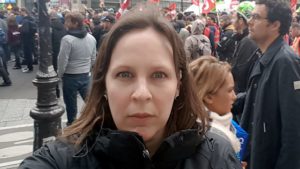 In my seventh Literary Pursuit I head off to Paris to learn all about the writing of one of the greatest works of French fiction, Victor Hugo’s Les Miserables. I discovered that the story behind the Victor Hugo’s classic novel is one of adultery, revolution, political intrigue and exile. And that it’s not so removed from contemporary Paris as one might think, given we got caught up in a street protest trying to find the hotel from the railway station!
In my seventh Literary Pursuit I head off to Paris to learn all about the writing of one of the greatest works of French fiction, Victor Hugo’s Les Miserables. I discovered that the story behind the Victor Hugo’s classic novel is one of adultery, revolution, political intrigue and exile. And that it’s not so removed from contemporary Paris as one might think, given we got caught up in a street protest trying to find the hotel from the railway station!
2019 BBC National Short Story Award with Cambridge University Launched!
 The 2019 BBC National Short Story Award with Cambridge University launches today, with the judges announced and submissions opening to find the best short story for 2019. It remains a total pleasure to work with the BBC on this partnership, and with First Story on the BBC Young Writers’ Award with First Story and Cambridge University, and the BBC Student Critics’ Award with First Story and Cambridge University. You can find all the details about the awards, including how to enter, here.
The 2019 BBC National Short Story Award with Cambridge University launches today, with the judges announced and submissions opening to find the best short story for 2019. It remains a total pleasure to work with the BBC on this partnership, and with First Story on the BBC Young Writers’ Award with First Story and Cambridge University, and the BBC Student Critics’ Award with First Story and Cambridge University. You can find all the details about the awards, including how to enter, here.
AI Narratives Report Published with the Royal Society
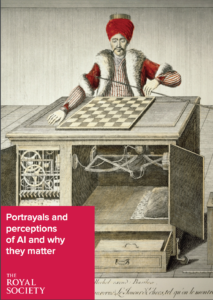 Over the past year, the AI Narratives project at the Leverhulme Centre for the Future of Intelligence, in collaboration with the Royal Society, has held a series of four workshops exploring:
Over the past year, the AI Narratives project at the Leverhulme Centre for the Future of Intelligence, in collaboration with the Royal Society, has held a series of four workshops exploring:
- which narratives around intelligent machines are most prevalent, and their historical roots;
- what can be learned from how the narrative around other complex, new technologies developed, and the impact of these;
- how narratives are shaping the development of AI, and the role of arts and media in this process; and
- the implications of current AI narratives for researchers and communicators.
Today we’re delighted to publish a report which brings together the conclusions of these workshops, and which should hopefully be useful for anyone interested in how AI is portrayed and perceived.
First Story Young Writers’ Festival at the University of Cambridge
 As part of the activities spinning out from the University’s partnership with the BBC and First Story on the short story awards, for the first year First Story held its Young Writers’ Festival on the Sidgwick Campus at Cambridge, on 25th September 2018. On the day, we welcomed 330 students between the ages of 11 and 17 from 19 schools across the East Midlands, London, Lancashire and East and West Yorkshire. The day was supported by more than 40 teachers, 26 writers and 25 volunteers. It was a packed programme, including 42 intensive creative writing workshops which ran throughout the day, led by 23 acclaimed writers including poets, playwrights and novelists. By the end of it, over 740 pieces of creative writing had been produced by students, teachers, and volunteers. More than 320 books were also bought by students and taken back across the country to new homes.
As part of the activities spinning out from the University’s partnership with the BBC and First Story on the short story awards, for the first year First Story held its Young Writers’ Festival on the Sidgwick Campus at Cambridge, on 25th September 2018. On the day, we welcomed 330 students between the ages of 11 and 17 from 19 schools across the East Midlands, London, Lancashire and East and West Yorkshire. The day was supported by more than 40 teachers, 26 writers and 25 volunteers. It was a packed programme, including 42 intensive creative writing workshops which ran throughout the day, led by 23 acclaimed writers including poets, playwrights and novelists. By the end of it, over 740 pieces of creative writing had been produced by students, teachers, and volunteers. More than 320 books were also bought by students and taken back across the country to new homes.
It was an absolute pleasure to see the campus I walked onto in 1995 for my first lecture as an undergraduate, terrified and bewildered at the new world I’d just been deposited in by my parents, buzzing with young people full of creativity, enthusiasm and a real sense of ownership of the space. I had fun chairing the plenary session with writers, Kei Miller, Shivanee Ramlochan, and Stephen Kelman, and attempting to field the many questions we were inundated with from an overwhelmingly engaged audience. The highlight though was the final session in which pupils took over the stage in the Lady Mitchell Hall and delivered the writing they’d created during the day – it was a deeply moving and powerful experience, and sometimes a very funny one, and was proof, if ever it’s needed, of the power and importance of creative writing as a way for young people to process their experiences of the world.
Global AI Narratives Launches, with first workshops in Singapore and Tokyo
Building on our work on the AI Narratives project at the Leverhulme Centre for the Future of Intelligence, this month we launched the Global AI Narratives, a three-year project running from 2018 to 2021. During that time, we’ll be holding ten one- to two-day workshops across 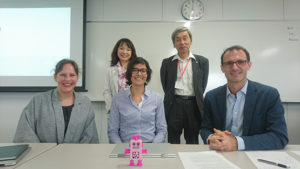 the world, each taking place in a different region outside the UK and North America. Each workshop brings together an interdisciplinary group of researchers and practitioners from fields related to AI narratives, such as science fiction scholars, artists, AI researchers, philosophers, writers, and anthropologists, in order to explore the prevalent AI Narratives in different regions of the globe. We hope that these collaborations will foster underrepresented voices that are currently absent from global AI debates.
the world, each taking place in a different region outside the UK and North America. Each workshop brings together an interdisciplinary group of researchers and practitioners from fields related to AI narratives, such as science fiction scholars, artists, AI researchers, philosophers, writers, and anthropologists, in order to explore the prevalent AI Narratives in different regions of the globe. We hope that these collaborations will foster underrepresented voices that are currently absent from global AI debates.
The first workshop took place at Nanyang Technological University in Singapore, and the second at Waseda University in Tokyo, in September 2018.

